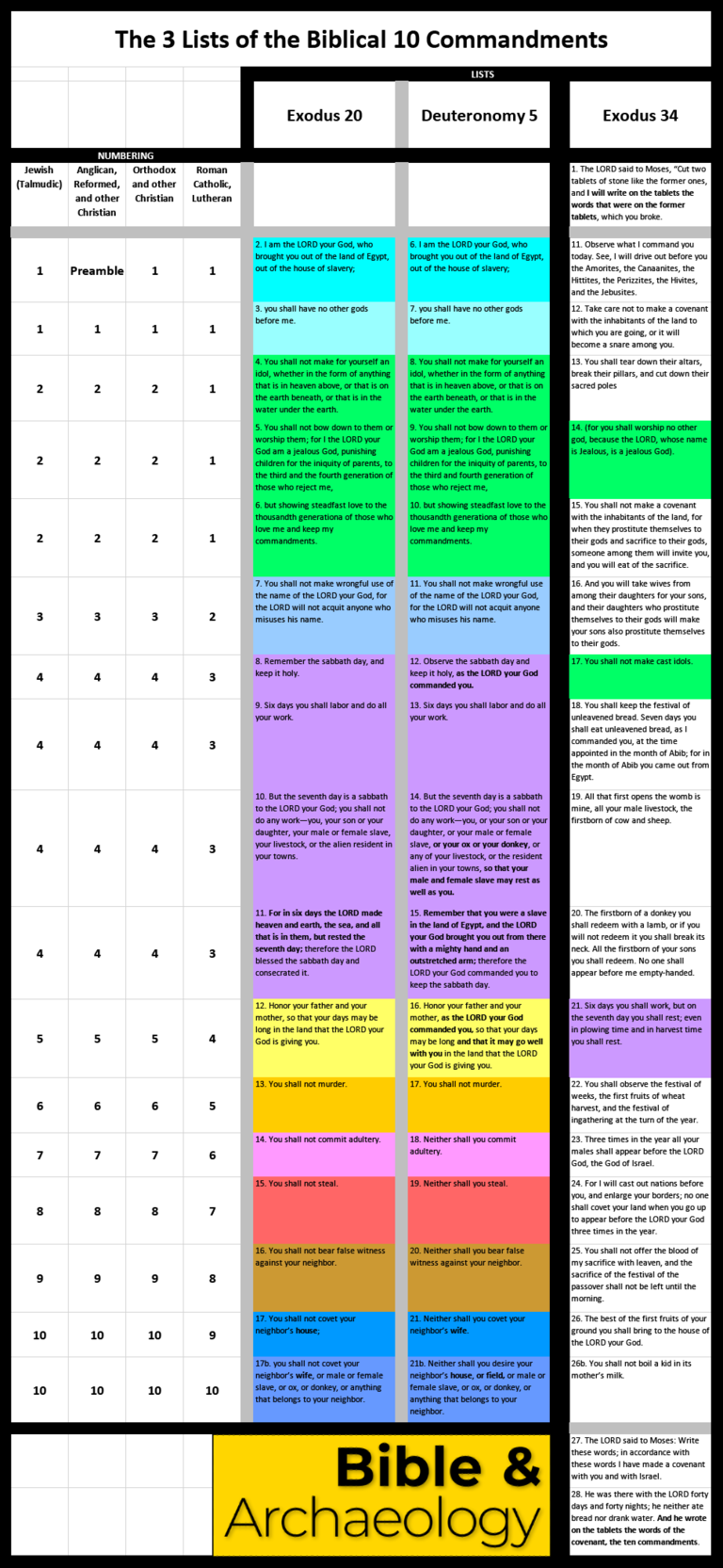Q: How many times does the list of the Ten Commandments appear in the Hebrew Bible?
A: Three*
What is most interesting about the three lists of the Ten Commandments is that they don't all match. Two of them are almost identical, but the third list, on which the Bible claims God wrote "the words that were on the former tablets, which you (Moses) broke," is quite different from the other two.
Exodus 20
The first instance of the Ten Commandments appears in Exodus 20:1–17. These are the basic commandments that most people know. What is interesting is that there are actually more than ten. This is because different groups count the commandments differently in order to maintain the more memorable number of ten. But if you look at this chart, you'll see that there are actually more than ten.
"I am the LORD your GOD" is considered to be the first commandment, although some groups see this as just an introductory statement or a preamble setting up the "actual" list. This is followed by "you will worship no other gods," followed by the prohibition against graven images or idols and the worship of them, followed by the prohibition against using the LORD's name in vain. These four commands are followed by the command to keep the Sabbath with the reasoning offered that since it took six days for the LORD to create the heavens and the earth, and even he rested on the seventh day, so too should humans rest on the seventh day of the week. This is followed by the command to honor one's father and mother. These first six commands are followed by the prohibitions against murder, adultery, theft, bearing false witness, and then the verse 17 prohibition against coveting, which many groups break into two separate commands: the prohibition against coveting a neighbor's house and the prohibition against coveting everything else (a neighbor's wife, a male or female slave, an ox, a donkey, or anything else that they own).

But, if you count up all of the different ways that all of the different groups split up these commandments, you'll see that there are actually 12 commandments:
1. I am the LORD your God.
2. Worship no other gods.
3. Don't make/worship graven images.
4. Don't use the LORD's name in vain.
5. Keep the Sabbath (because of Creation).
6. Honor father and mother.
7. Don't murder.
8. Don't commit adultery.
9. Don't steal.
10. Don't bear false witness.
11. Don't covet neighbor's house.
12. Don't covet neighbor's wife, male or female slave, ox, donkey, or anything else.
Again, note how different groups (Jewish and Christian) group these commandments so that they always total ten.
Exodus 34
The second instance appears in Exodus 34:10–26. The commandments are bracketed by an introduction in verse 34:1, which says,
"I will write on the tablets the words that were on the former tablets, which you broke,"
and a conclusion in verses 27–28, which reads:
"The LORD said to Moses: Write these words; in accordance with these words I have made a covenant with you and with Israel. He was there with the LORD forty days and forty nights; he neither ate bread nor drank water. And he wrote on the tablets the words of the covenant, the ten commandments."
And despite this introduction and this conclusion, clearly stating that these are the same Ten Commandments that were on the first tablets given to Moses, the actual commandments that come in between the introduction and conclusion are markedly different from the commandments in Exodus 20, which this new set was supposedly replacing.
While there is a command against the creation and worship of idols, and a command to keep the Sabbath, the remainder of the commands appear to deal more with covenants, festivals, and sacrifices. For example, "don't make a covenant with the Canaanites"; "keep the festival of Unleavened Bread"; "the first offspring of every womb belongs to me"; "don't offer the blood of a sacrifice with leaven"; and then there's the famous, "don't boil a young goat in its mother's milk," which originally was likely a prohibition against animal cruelty, or a caution against killing both the mother and the offspring together (thus eliminating future sources of food), but which came to be the source of the Jewish prohibition against mixing milk and meat.
Deuteronomy 5
The third and final appearance of the Ten Commandments appears in Deuteronomy 5:6–21, and this set of commandments is nearly identical to the first list in Exodus 20, except for a couple of small items. The first is the rationale offered for keeping the Sabbath. In Exodus 20:11, the reason for keeping the Sabbath is to honor the fact that after God created the heavens and the earth in six days, he rested on the seventh day: ("For in six days the LORD made heaven and earth, the sea, and all that is in them, but rested the seventh day; therefore the LORD blessed the sabbath day and consecrated it"). However, in Deuteronomy 5:15, the reason for keeping the Sabbath is the Exodus from Egypt, and the fact that as slaves the Israelites were not allowed a day of rest before God miraculously delivered them from Pharaoh: ("Remember that you were a slave in the land of Egypt, and the LORD your God brought you out from there with a mighty hand and an outstretched arm; therefore the LORD your God commanded you to keep the sabbath day").
The other difference between the commandment lists in Exodus 20 and Deuteronomy 5 beyond some wording here and there is the order of the coveting commandments. In Exodus 20:17, the commands are to avoid coveting a neighbor's house, and then his wife, followed by his male or female slaves, ox, donkey, or anything else that belongs to him. However, in Deuteronomy 5:21, the order of wife and house is reversed, and the prohibition against coveting a neighbor's field is added: "Neither shall you covet your neighbor’s wife. Neither shall you desire your neighbor’s house, or field, or male or female slave, or ox, or donkey, or anything that belongs to your neighbor."
So, you can see that there are three lists of the Ten Commandments, with two lists (Exodus 20 and Deuteronomy 5) appearing almost identical, and the third (Exodus 34), appearing much different than the others, despite the claim in Exodus 34:1 that God "will write on the tablets the words that were on the former tablets, which you broke," and the express conclusion in Exodus 34:28 that Moses "wrote on the tablets the words of the covenant, the ten commandments."
*For extra study: Leviticus 19
Some scholars find a partial list of most of the commandments in Leviticus 19. While this list appears in a different (priestly) context, it certainly contains more of the Exodus 20/Deuteronomy 5 commandments than does the Exodus 34 list, including (in this order, with parallels to Exodus 20/Deuteronomy 5 lists in bold):
1. Revere your father and mother (19:3)
2. Keep my sabbaths (19:3)
3. No idols/cast images (19:4)
4. Offer acceptable well-being sacrifices (19:5–8)
5. Don't reap the edges of your fields (19:9)
6. Don't strip vineyard bare/gather fallen fruit (19:10)
7. Don't steal (19:11)
8. Don't deal falsely (19:11)
9. Don't lie to one another (19:11)
10. Don't swear falsely by my name (19:12)
11. Don't defraud neighbor (19:13)
12. Don't steal (19:13; cf. 19:11)
13. Don't keep labor wages until morning (19:13)
14. Don't impede the deaf and blind (19:14)
15. Don't render unjust judgment (19:15)
16. Don't slander (19:16)
17. Don't hate in your heart your family (19:17)
18. Don't take revenge (19:18)
19. Love your neighbor as yourself (19:18)
20. Don't breed different animals (19:19)
21. Don't sow different seeds in same field (19:19)
22. Don't wear garments of two materials (19:19)
23. Sex with a slave betrothed to another is not adultery (19:20–22)
24. Don't eat the fruit of a newly planted tree in the conquered land until the fifth year (19:23–25)
25. Don't eat blood (19:26)
26. Don't practice augury/witchcraft (19:26)
27. Don't cut hair of temple or edge of beard (19:27)
28. Don't mutilate your flesh/tattoo (19:28)
29. Don't pimp your daughter (19:29)
30. Keep my sabbaths and revere my sanctuary (19:30; cf. 19:3)
31. Do not engage wizards/mediums (19:31)
32. Respect your elders (19:32)
33. Don't oppress resident aliens (19:33–34)
34. Don't cheat with measures (19:35–36)
35. Keep all of my statutes (19:37)
Originally Published September 10, 2021
